Abstract
In the article forms of laughable delegitimization of the official pre-election media discourse in the news content of the Internet media "The Real Lentach" are considered. The authors came to the conclusion that the process of delegitimization reproduces national and political peculiarities of thinking. Thus, the main vector of using the principles of laughable culture is associated with a decrease in the status of a participant in the election campaign, the destruction of the authority of a politician, as well as with the derationalization of the actions and acts of the subjects of electoral procedures. Based on the theory of legitimization / delegitimization, the authors analyzed the key strategies for deconstructing the official election discourse of news content in Internet media. The leading strategy is the delegitimization of the status or authority of a participant in the election process, the main semantic opposition is the confrontation of the personalized image of the president and the oppositionist. On the second line is the removal of legitimacy through the destruction of rational arguments, the expediency of the actions of the candidates. In general, delegitimization strategies reflect the structure official electoral discourse, but with a modified semantic modality. To a lesser extent, strategies are used to delegitimize values and explanatory stories.
Keywords: Laughing culturenewselectionsInternet discoursedelegitimizationmemes
Introduction
In his article "Humorous society", published in the collection "Era of emptiness. Essay on modern individualism" Lipovetsky (2001) notes that in the era of humorous postmodern society laughter disappears, loses its sacred meaning. The question arises about the content of laughter in a situation of total irony, the status of tradition. However, it is the various forms of funny that determine the modus of mass communication texts in the online environment, in many ways form the media image of a particular sphere of public consciousness, and thus construct a cognitive model that determines the perception of social reality. Discourse practices can lose touch with referents, actualizing only the game aspect of the funny. As noted by Kasimov (2012), laughter becomes a necessary attribute of the communicative component of culture, as "electronic communication is the most progressive expression of "games between people", which are the essence of post-industrial society" (p. 68).
In the modern Russian-language media discourse, the existence of two ideologically opposed poles has clearly emerged. On the one hand, the media expressing an official point of view on the main issues of the information picture, on the other hand, the media focused on the expression of an alternative position that does not coincide with the official one. However, the differences are also related to the reception of the modus funny by different actors of the information field. In the first case, there is a taboo on everything "funny" in the representation of public information, in the second – the forms of laughter receive the status of a conventionally defined norm. In this sense, there is a clear polarization in the representation of electoral discourse in different types of media.
Problem Statement
The news content of such Internet media as "The Real Lentach", forms a pre-election media discourse which is unambiguously opposed to a pre-election discourse in respect of laughter use as bases for creation of concrete texts. It is the ridiculous beginning that becomes a sign of the pre-election media discourse of alternative media. The ridiculous beginning, on the one hand, becomes a typical practice, which is ambiguously perceived by different types of audience and the media focused on the official point of view of the elections in Russia. So, we can say the existence of opposition sentiments and their representation in the discourse of some Internet media. This reveals the problem of using the funny in the formation of news content of Internet media, its correlation with the news content of Pro-state media.
Research Questions
There is a question associated with the thesis, which was expressed by Lipovetsky (2001): can laughter in the modern socio-cultural situation have a higher purpose (not entertainment and self-reflection). On the other hand, there is an open question about the existence of ways to Express an alternative point of view within the framework of the pre-election media discourse and, conversely, the degradation of the laughing culture.
Laughter as a category of culture
In Russian-language scientific thought, the study of laughter culture is one of the basic vectors. Starting with the works of M. M. Bakhtin, D. S. Likhachev, A. M. Panchenko and N. V. Ponyrko, studied in detail the folk laughing culture (synonyms: carnival culture, grassroots culture). This type of culture was opposed to official, serious, culture. In European culture, this problem was dealt with by Eco (2018), who proved the deep symbolic meaning of many marginal phenomena of modern culture, including funny and ugly.
So, Bakhtin (1990) even builds pairs-antitheses in which the basic aesthetic principles of competing paradigms are explicated (top–bottom, head–body bottom, etc.). "The Grassroots" culture gives laughter a symbolic meaning: laughter as a symbol of eternal renewal, removal of fear of death. In the works of Likhachev laughter appears as a form of a special sacred worldview that regulates social reality, religious and moral aspect of life (Likhachev, Panchenk, & Ponyrko, 1984).
Thus, the laughing culture does not disappear, but is a component of modern society, appears as a system that generates meanings. As Likhacheva and Fadeeva (2015) write, based on the concept of "cultural production", laughable culture – "this is a way of producing, broadcasting and consuming funny as an emotional reaction to the exposure of absurdities, stereotypes, illusions, life phenomena and situations" (p. 137), that is, it is a system of production of meanings, which becomes the basis for the construction of a certain part of the discourse practices of the information space.
Especially acute is the question of actualization of laughable culture arises in the study of Internet discourse. So, in the article "Laughter culture of videoblogging" argues that humor and irony – the Foundation of communication between the blogger and audience (Boronenkov, 2017, p. 127). It is recognized that today the use of forms of funny determines the effectiveness of online communication (funny advertising, comic messages of individual users of social networks and Internet media, humor bloggers, etc.). Today, there are studies of the technical capabilities to extract emotions from creolized (multilingual) text with the help of intelligent text processing and computational linguistics, the definition of laugh modality, for example, Jain, Kumar, and Fernandes (2017). Thus, the presence of laughter in the texts of mass communication becomes a sign of belonging not only to different political and ideological camps, but also to aesthetic and discourse paradigms.
This cultural mechanism for the production of meanings and discourse determines one of the trends in the creation of news content in Internet media and is associated with the use of various forms of funny, that is, text-generating practices that transmit special values and socio-political views of a certain part of Russian society that does not accept the official point of view on the public sphere, including political elections. These practices construct a special attitude to various social institutions, including elections.
Laughter as a tool of delegitimization of the election campaign
Thus, the principles of laughable culture are formed within the framework of the news content of the media discourse, delegitimizing the election campaign, aimed at deconstructing the conventions of the official public discourse on the election of the media.
Ross and Rivers (2017) are conducting a study of strategies for delegitimizing subjects of the us President's election campaign in 2016. They are based on an article by Van Leeuwen (2007) on strategies and tactics to legitimize a subject, event or idea in mass communication texts. Thus, Van Leeuwen (2007) singled out four strategies for asserting the rule of law: Authorization, Moral evaluation, Rationalization, Mythopoesis. In the first case, there is an appeal to the authority, the status of the social role, in the second case – an appeal to the General values and moral and ethical standards, accepted by the majority or the target audience, in the third – the desire to rationalize the purpose of their actions and words, an explanation of expediency, in the fourth case, there is a story telling that contains a ban or a positive result depending on the values professed. Ross and Rivers (2017) on this basis formulated four basic strategies of the reverse process, that is, the delegitimization of the participants of the election campaign. In their opinion, the legitimization and delegitimization are discursive phenomena, as connected with the transmission of the image of the subject of the political processes at the level of the speech practices ("to speak the same language, share the same values and regulations") or, on the contrary, are based on the violation or deviation of the speech practices of the subject from the practices of the audience, the difference in their value potential. Ross and Rivers (2017) explain, the lack of coincidence of rhetorical codes among the participants of communication is associated with delegitimization the words and actions of one of the parties. Delegitimization is possible only when there is a violation, including serious presented in a ridiculous way. Laughter is a tool of delegitimization, as it violates rhetorical alignment, violates the norm.
Karasik (2018), analyzing cognitive aspects of a joke as speech genre, also points out this feature of laughter as the phenomenon breaking norms, semantic and communicative expectations: "the text containing a joke is oriented on two various scripts (general concept of reality), these scripts are in the appositive relations, and the main types of opposition come down to oppositions "real/unreal", "normal/unexpected", "possible/impossible"" (p. 897).
Thus, laughter is an instrument of delegitimization of pre-election discourse, as it is based on violation of norms and conventions of the official discourse on elections, represented by Pro-government media. The academic literature presents a body of work on the use of laughter and irony in social media policy discussions. According to them, laughter becomes a way of expressing an alternative point of view on the actions of candidates of the election campaign, a way of expressing opposition ideas, criticism and creating controversy. Sanina (2014) in article "Visual political irony in Russian new media" considers use by users of irony and visual images for expression of dissatisfaction with activity of politicians. The author calls this media esthetic phenomenon "a new form of political dialogue". Key is a statement about total irony in visual images of any political myths and concepts. The key is the statement about total irony through visual images of any political myths and concepts. In a separate row there are works devoted to the study of political pre-election media discourse presented in Internet memes. Memes become a way of creating funny, actualize laughter in specific sensory-perceived forms at the junction of various semiotic codes. The most common method of creating news reports on the election theme is associated with the use of Internet memes. A detailed historiographical review of publications on meme culture is presented in the works of Shifman (2014), Ross and Rivers (2017) and Shomova (2018). We can say that Internet memes become the main unit of information in the pre-election discourse of Internet media news content.
Purpose of the Study
The aim of our study was the analysis of news content about the election of the President of the Russian Federation 2018 submitted to the community Internet media "The Real Lentech", which will allow us to determine the function of laughable elements in the creation of certain texts, and the expression of alternative political views to the polls to determine the semantics of the laughter, his socio-critical potential. An important issue is the delegitimization of the official public discourse on elections as a manifestation of social and political activity.
Research Methods
As a method of research we used multimodal discourse analysis, so it allowed to interpret the principles of laughable culture used in the news content of Internet media in the representation of electoral discourse, within the framework of current text-generating practices, popular forms of mass communication. When using the method of multimodal discourse analysis, we relied on the article by Zagidullina (2019) "Multimodality: on the question of terminological certainty", which provides an overview of the main research points of view, analysis tools. The author emphasizes: "It should be noted that multimodal discourse analysis and its varieties (for example, critical multimodal discourse analysis) are aimed at interpreting communicative practices in terms of identifying meanings that elude the analysis of certain aspects of communication (for example, expressed only in the form of recording verbal exchange)" (Zagidullina, 2019, p. 184).
Findings
The empirical base of the study was the news reports in the group "The Real Lentach" from January to September 2018 (in the framework of the study supported by the Russian science Foundation, № 18-18-00007). The dates were determined in connection with the election campaign and presidential elections of the Russian Federation (18 March 2018) and regional elections (September 2018). In the case included 73 texts.
It was found that most of the reports are cartoons, the plot of which is based on the ironic and sarcastic play on real events or facts of the election campaign, on a conscious violation of stereotypes of the official public election media discourse. These are examples of political satirical cartoons that use various precedent phenomena (quotes, memes, photos, "gifs", videos) and Express a critical attitude to the official discourse. The basic premise here is the destruction of the values and norms of this official discourse.
In the first position on the frequency of use are memes built on delegitimization of status, authority, on the violation of conventions on the social role of politics (35 of 73). The main topics here can be called the reduction of the image of the President as a political subject, his ironic personalization and marginalization. On the other hand, reduction of the exposed image of the opposition, Navalny, Sobchak, and others. This opposition encounters a semantic boundary, which describes the political landscape: the confrontation of the President and the few opposition members. Thus, the first example (Figure
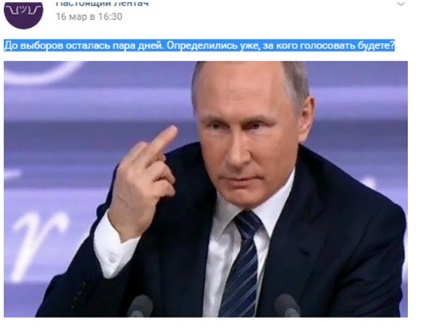
The second example (Figure
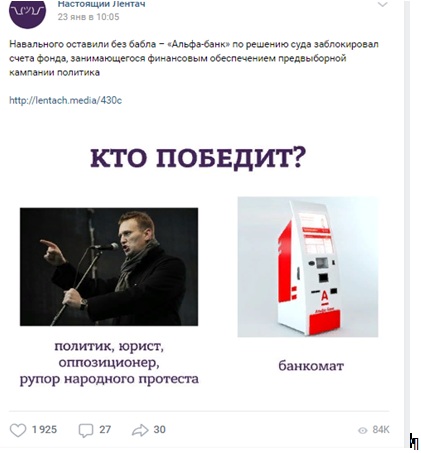
In second place are memes that use the technique of destruction of rationalization of actions or statements (23). Thus, in the news, the rationality of the campaign participants ' behavior is destroyed through the creation of absurdity or absurdity of what is happening (Figure
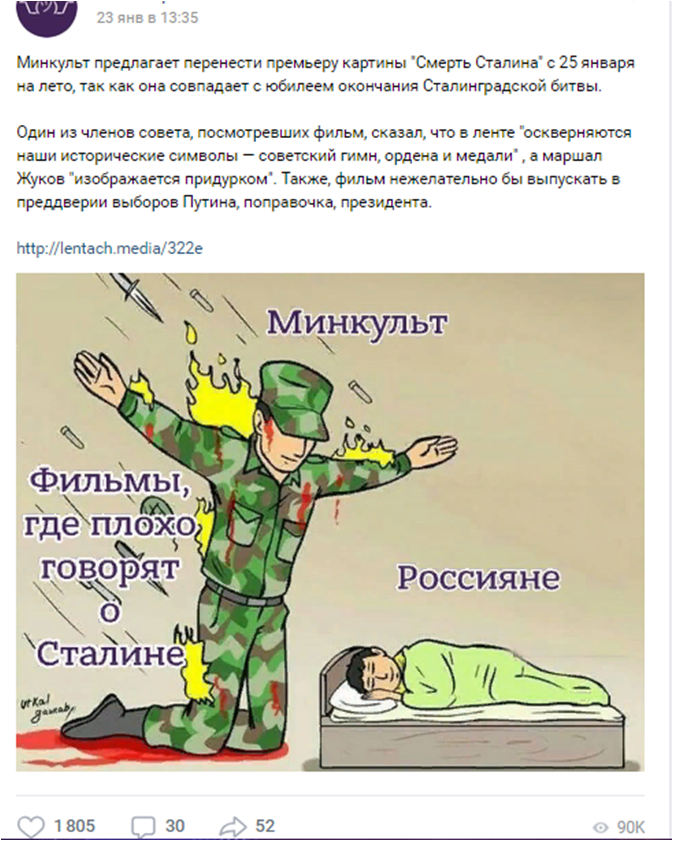
All judgments on the appropriateness of procedures and activities are presented as a travested situation. Example number three derides and leads to delegitimization an explanation about need of censorship during the election period, about rationality an act of the supervising agency behind cinema products devoted to Stalin.
Less popular are memes based on the ridiculous representation of mismatches of values (10) and the creation of explanatory stories (5). In the situation of the value gap, violations of liberal-democratic values are primarily played out in a ridiculous way, irony over the majority is presented as an ideological concept in the pre-election media discourse. Figure
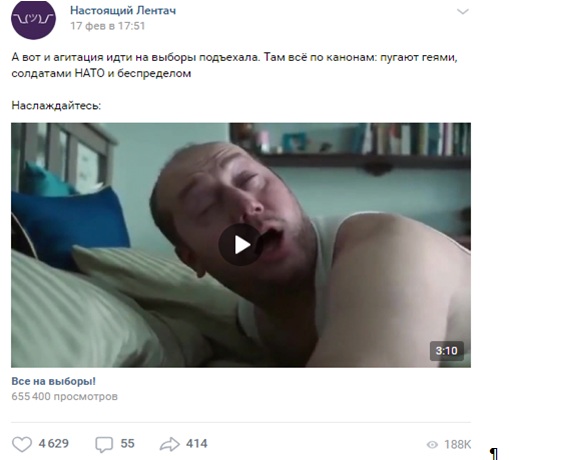
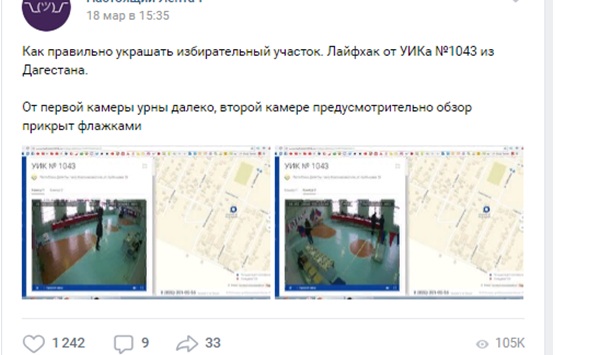
The results of the monitoring show that delegitimizing the official pre-election media discourse, news reports are based on beating the initial messages. About this tradition, the creation of a satirical version of messages from the official election media discourse, writes Piata (2016), analyzing texts in social networks, ridiculing participants in the election campaign in Greece. On the other hand, we see the reproduction of the features of the political, wider – national mentality. Thus, in the traditionalist types of society, the main role is played by the leader, authority, therefore, the media with the status of official and Internet media actively use legitimization/delegitimization through an appeal to the status of the subject of the election campaign, to authority. The second position, which is occupied by memes built on the destruction of rationalization, is related, in our opinion, to the orientation of the media image of V. V. Putin and D. A. Medvedev on the logical-rational behavior, that is, to explain, demonstrating professionalism (the practice laid down during the transition of power from Yeltsin to Putin). The lesser popularity of memes based on playing with the value gap and explaining stories is explained by the value crisis in modern Russian society and distrust of public statements.
However, radical delegitimization discredits the very concept of elections, that is, certain areas of political communication become a source of comic, humorous. There is a phenomenon of "humorous society" (Lipovetsky, 2001), the news about the elections will be read/viewed only when it is funny, only then will cause a desire to comment.
Conclusion
Thus, a pre-election media discourse of independent media in the news content of Internet media was formed, in which a ridiculous form of information presentation comes to the fore. On the one hand, it is a way to broadcast the opinions of dissenting social groups, their moods, the manifestation of social activity, on the other hand, the effective use of the trend, to be funny, to show a sense of humor, that is, a purely pragmatic function.
Acknowledgments
Prepared by Vasilii Fedorov part of the article (50% of the text), was written with the support of RSF, 18-18-00007
References
- Bakhtin, M. M. (1990). Tvorchestvo Fransua Rable i narodnaya kul'tura srednevekov'ya i Renessansa [Works by Francois Rabelais and the folk culture of the Middle Ages and the Renaissance]. Moscow: Fiction.
- Boronenkov, A. Ye. (2017). Laughter culture of video blogging [Smekhovaya kul'tura videobloginga]. CHelovek. Kul'tura. Obrazovanie, 1(23), 122-128.
- Eco, U. (2018). Istoriya urodstva [The history of ugliness]. Moscow: WORD / SLOVO.
- Jain, V. K., Kumar, Sh., & Fernandes, S. L. (2017). Extraction of emotions from multilingual text using intelligent text processing and computational linguistics. Journal of Computational Science, 21, 316-326.
- Karasik, V. I. (2018). Algoritmy postroeniya komicheskih tekstov [Algorithms for the construction of comic texts]. Bulletin of Peoples' Friendship University of Russia. Series: Linguistics, 22(4), 895-918. DOI: 10.22363 / 2312-9182-2018-22-4-895-918.
- Kasimov, R. Kh. (2012). Funkcionirovanie smekha v epohu postindustrilizma [Funing laughter in the era of post-industrialism]. In Istoricheskie, filosofskie, politicheskie i yuridicheskie nauki, kul'turologiya i iskusstvovedenie. Voprosy teorii i praktik, Vol. 4(18). Part I. (рр. 64-68). Tambov: Diploma.
- Likhachev, D. S., Panchenko, A. M. & Ponyrko, N. V. (1984). Smekh v Drevnej Rusi [Laughter in Old Russia]. Leningrad: Science, Leningrad branch.
- Likhacheva, L. S. & Fadeeva, K. A. (2015). Smekhovaya kul'tura kak sposob proizvodstva, translyacii i potrebleniya smeshnogo [Laughter culture as a method of production, transmission and consumption of the ridiculous]. Izvestiya Ural'skogo federal'nogo universiteta, 144(4), 135-144.
- Lipovetsky, J. (2001). YUmoristicheskoe obshchestvo [Humorous Society]. In Lipovetsky, J. Era pustoty. Esse o sovremennom individualizme [Era of Emptiness. Essay on modern individualism] (рр. 200-251). Moscow: Vladimir Dal.
- Piata, A. (2016). When metaphor becomes a joke: Metaphor journeys from political ads to internet memes. Journal of Pragmatics, 106, 39-56.
- Ross, A. S., & Rivers, D. J. (2017). Digital Cultures of Political Participation: Internet Cultures of the International Participation of the U.S Presidential Candidates. Context and Media, 16.
- Sanina, G. A. (2014). Visual political irony in Russian new media. Discourse, Context and Media, 6, 11-21.
- Shifman, L. (2014). Memes in Digital Culture. Massachusetts: MIT Press.
- Shomova, S. А. (2018). Memes as they are. Moscow: Aspect Press.
- Van Leeuwen, T. (2007). Legitimation in discourse and communication. Discourse & Communication, 1(1), 91-112. DOI:
- Zagidullina, M. V. (2019). Mul'timodal'nost': k voprosu o terminologicheskoj opredelennosti [Multimodality: on the issue of terminological certainty]. Znak: problemnoe pole mediaobrazovaniya, 1(31), 181-188.
Copyright information

This work is licensed under a Creative Commons Attribution-NonCommercial-NoDerivatives 4.0 International License.
About this article
Publication Date
07 August 2019
Article Doi
eBook ISBN
978-1-80296-065-5
Publisher
Future Academy
Volume
66
Print ISBN (optional)
-
Edition Number
1st Edition
Pages
1-783
Subjects
Communication studies, press, journalism, science, technology, society
Cite this article as:
Fedorov*, V., & Tretyakova, E. (2019). Laughter As The Instrument Of Delegitimization Of An Election Campaign Of 2018. In Z. Marina Viktorovna (Ed.), Journalistic Text in a New Technological Environment: Achievements and Problems, vol 66. European Proceedings of Social and Behavioural Sciences (pp. 754-763). Future Academy. https://doi.org/10.15405/epsbs.2019.08.02.89
